(AOF) – Valneva has signed a new contract worth a minimum of $32 million with the US government for the supply of its Ixiaro Japanese encephalitis vaccine. Under this new one-year contract, DoD will purchase Ixiaro vaccines worth a minimum of $32 million and will have the option to purchase additional doses over the next twelve months. Deliveries will begin immediately. Ixiaro is the only vaccine against Japanese encephalitis approved by the US Food and Drug Administration (FDA).
The vaccine was developed under a collaborative research and development agreement with the US Army’s Walter Reed Army Institute of Research.
Valneva ensures the marketing and distribution of Ixiaro to the American army and on the American private market.
AOF – LEARN MORE
Key points
– Specialist in the development of prophylactic vaccines against infectious diseases with limited therapeutic options;
– Turnover of €361 million from vaccines, notably for travelers, for 32% and for the rest mainly from contracts for the supply of vaccines against COVID-19;
– Business model: portfolio of diversified vaccines for the general public, financing of clinical developments through a specialized infrastructure, 2 commercial vaccines (Ixiaro and Dukoral against Japanese encephalitis and cholera) and distribution rights for third parties;
– Capital held 13.02% by the Grimaud la Corbière group and 8.19% by BPI France, Frédéric Grimaud chairing the supervisory board of 6 members and Thamas Lingelbach the management board;
– Solid balance sheet with €307 million in equity versus €42 million in debt, reinforced by net cash of €204 million at the end of June 2023.
Challenges
– Medium-term strategy based on financing R&D through sales of Ixiaro and Dukoral vaccines, extension of the manufacturing network (3 sites, in Scotland, Sweden and Austria) and partnerships promoting the group’s assets;
– Innovation strategy inherent to the business model, rich in a portfolio of 398 patents and supported by €173 million in R&D costs, with 3 main assets and 3 preclinical programs:
– the only vaccine in clinical development against Lyme disease,
– the only single injection vaccine against chikungunya,
– the only inactivated and adjuvanted whole virus COVID-19 vaccine,
– vaccine candidates against human metapneumovirus, parvovirus and norovirus;
– Environmental strategy: energy efficiency, waste minimization, optimal use of water and 5% reduction, compared to 2016, in CO2 emissions by 2025;
– Good visibility of the activity thanks to agreements on vaccines with: with Pfizer to co-develop and sell the vaccine against Lyme disease ($308 million),
– with the American authorities for Ixiario against Japanese encephalitis ($70 million),
– with Bavarian Nordic for the marketing and distribution of specialized vaccines,
– with Batavia Biosciences to develop an inexpensive vaccine against polio,
– with the Butantan institute against chikingunya for low-income countries. – Securing the launch of the chikingunya vaccine through private financing of €100 million; –
Towards a change in governance by the end of the year, for a board of directors and executive committee.
Challenges
– Waiting for the end of November for the approval of the American authority for the sale of the vaccine against chikingunya and that of the European Union for Covid 19 (60 million doses) and result of phase 3 trials for the vaccine against Lyme disease ;
– Travel sensitivity of sales of vaccines already marketed (against Japanese encephalitis and cholera);
– 2023 objectives: revenues of €220 to €260 million including €130 to €140 million in product sales, including marginal sales of anti-COVID-19 vaccines in the Kingdom of Bahrain, and €110 million in other operational products,
– R&D expenses of approximately €80 million.
Learn more about the Pharmacy sector
Biotechs put to the test
These companies are suffering from a much less favorable economic cycle, which is reflected in particular by a drop in venture capital financing of start-ups. These companies are therefore obliged to carry out layoff plans. Added to this is a much more restrictive regulatory framework. First, in the United States, measures linked to the Inflation Reduction Act (IRA) could have a strong impact on the margins of stakeholders. Indeed, from 2026, the federal Medicare program will be able to renegotiate the price of drugs marketed for nine years (chemical) or 13 years (biological), with discounts that could range from 35 to 60% for biotechs. Likewise, in Europe, with the new drug regulations presented in Brussels in April, the duration of patent protection will be reduced if the innovative treatment is not marketed in all member countries within two years.
